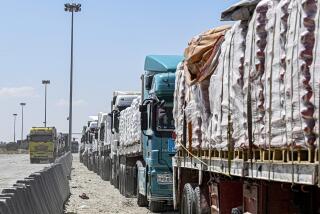CRISIS IN THE PERSIAN GULF : Israeli Issues Seen as Peril to Gulf Alliance
- Share via
LONDON — Efforts to link Iraq’s seizure of Kuwait with the Arab-Israeli conflict are threatening to open cracks in the Arab-Western alliance against Iraq, and the killing of 21 Palestinians by Israeli forces last week in Jerusalem has aggravated the situation, diplomats and analysts say.
“Israel’s action in Jerusalem has definitely put more pressure on the Western coalition,” one British diplomat observed. “This will not help matters in the alliance.”
At the same time, Simon Lunn, an official with the North Atlantic Assembly in Brussels, asserted: “We say there’s no linkage, but the shootings in Jerusalem reinforce what we know in reality: These two situations, in Arab eyes, are not unconnected.”
And France’s President Francois Mitterrand has declared, “I don’t want to mix these two questions, but one cannot try to defend human rights in one area and neglect them in another.”
European officials generally tend to resist connecting Iraq’s seizure of Kuwait in August with Israel’s seizure, in the Arab-Israeli War of 1967, of the West Bank and Gaza Strip, but they take the position that Israel should negotiate with Palestinians at an international conference. Israel has rejected this view.
British Foreign Secretary Douglas Hurd was among the most outspoken in warning that failure by the U.N. Security Council to condemn Israel could have jeopardized the united front against Iraq.
“I am very clear when talking to Arabs that the Arab-Israeli dispute is not like (Iraqi President) Saddam Hussein’s aggression against Kuwait,” Hurd said. “Equally, when talking to Israel, we are all entitled to say: ‘Is this what Israel is about, trying to bring about your own security by this kind of repression and denying all rights to the people whose territories you occupy?’ ”
Hurd believes in setting up an international conference on settling the Arab-Israeli dispute, but only after the Persian Gulf crisis is resolved.
Angelika Volle, European specialist at the Foreign Policy Institute in Bonn, said the problem is that “European allies have never worked out a truly coordinated policy on the gulf.”
Now, another potentially serious difference in the gulf conflict has surfaced between the United States and its European allies: what to do in the event Hussein decides to pull his forces out of Kuwait.
The United States, Britain and Arab allies such as Saudi Arabia and Egypt are inclined to punish Hussein even if he does withdraw. But most European countries--and by far the majority of the United Nations--reportedly would settle for withdrawal, which is all the various Security Council resolutions call for.
“If Hussein does decide to pull out,” one European diplomat in London said, “then there are going to be differing views on what to do next.”
Lunn noted: “Some observers are calling this the worst-case scenario: Saddam pulls out unpunished and remains in Baghdad, with sanctions removed, in a position to do it again. This could cause consternation, and one could see a breach among the members of the alliance on what to do next.”
French Foreign Minister Roland Dumas argues that it is essential for Western Europe to provide protection for Palestinians living under Israeli rule or face Arab accusations that it is operating under a double standard in defending Kuwaitis but not Palestinians.
Dumas, like Hurd and Italian Foreign Minister Gianni De Michelis, is calling for a foreign ministers’ conference to deal with the Israeli-Palestinian dispute.
Some British and American hard-liners fear that Mitterrand may be seeking an accord with Hussein that will fall short of total evacuation from Kuwait.
Meanwhile, Israel, which has had no role in the anti-Iraq military buildup, has been the most persistent in warning that Hussein must be brought down. Its view has been supported by hawks in the United States, Britain and the Arab world.
As expressed by one diplomat in London, this view is as follows: “If Hussein is allowed to withdraw from Kuwait unpunished, he will remain strong, in control of his country, and in two or three years, with the oil flowing again, be in a position to undertake a massive attack with non-conventional weapons. The allied troops will have pulled out, and will we be prepared to deploy the same forces again to stop him?”
Hans Binnendijk, director of studies at the International Institute for Strategic Studies in London, said: “Even in the U.S., there are divisions between the Pentagon, which doesn’t want to let Hussein off the hook, and those who would settle for a pullout. Except for Britain, the European allies are in a much more cautious mode.”
More to Read
Sign up for Essential California
The most important California stories and recommendations in your inbox every morning.
You may occasionally receive promotional content from the Los Angeles Times.










